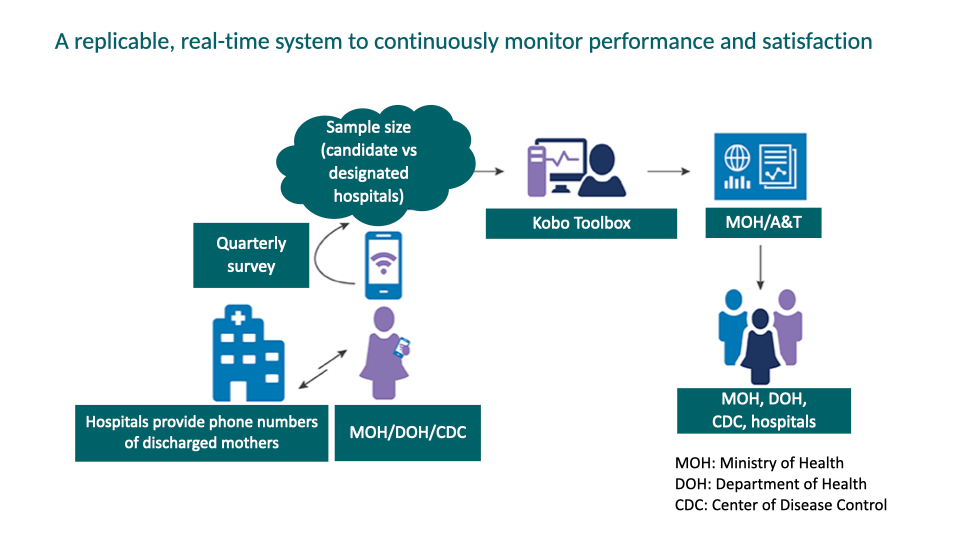
Birthing Experience Survey: Improving newborn care
 Supporting women to voice their experiences during childbirth.
Supporting women to voice their experiences during childbirth.
Childbirth is a particularly vulnerable time for mothers and babies. Our innovation puts women at the heart of health care service delivery by ensuring that their feedback is used to drive results. By bringing women’s voices forward, we are seeing improvements in hospital performance and care practices, which, in turn, is generating a culture of excellence and sparking healthy competition.
“When the hospital receives the phone survey report, the Director Board will convene a meeting with hospital personnel to decide if an issue exists and devise a solution.” – Head of Postpartum Ward, Hospital.
A disruptive innovation – A new idea, model, product, or service in an existing market.
Alive & Thrive partners with the Ministry of Health, Maternal and Child Health Department in Viet Nam, the Centres of Disease Control, and Provincial Departments of Health.
Challenging the Status Quo to Impact Nutrition
Q: What solution is offered by this innovation?
The lack of accountability from service providers to the populations they serve is a common problem within the health sector, often leading to suboptimal, and sometimes negligible, care. Without considering clients’ feedback, health care facilities have a limited incentive to ensure that services are responsive and tailored to the needs of their users.
The Birthing Experience Survey provides an external monitoring system critical for establishing and maintaining quality care in our partnering hospitals in Viet Nam. Through Alive& Thrive we have established Centers of Excellence for Breastfeeding (COE). Hospitals only qualify for the COE status once they have fulfilled established criteria necessary to support mothers with early breastfeeding and promote skin to skin contact.
The Birthing Experience Survey allows women to assess adherence to COE criteria once they are discharged from hospital. Telephone consultations create an opportunity to express concerns or voice positive experiences, while hospitals not only receive their own results but comparison data with peers. Many women post experiences on social media, which is improving transparency and informing women about their right to quality care.
“The CoE Birthing Experience Survey results provide us with evidence of Breast Milk Substitute Code violations, which are hidden, and hospital directors might not be able to identify. We fired staff involved.” – Deputy Director of a hospital
Q: What is most exciting about the Birthing Experience Survey?
We are excited by the way that we have created demand for the mother’s surveys through strong brand recognition, associated with high-quality care and improved outcomes for babies and mothers.
We also very excited by results so far – from the beginning of 2019 to the third quarter of 2021, prolonged skin-to-skin contact has nearly doubled (from forty one percent to seventy percent for vaginal births and from thirty eight percent to sixty nine percent for caesarean births). The provision of breastfeeding counseling also increased to almost one hundred percent. By making women active participants in their health care, service provision is improving, and hospitals are responding to issues that otherwise went neglected.
Q: How does the Birthing Experience Survey support system wide change?
The surveys are a cost-effective method for hospitals to see improvements in health outcomes for mothers and newborns, further incentivizing the continuation of new practices and increasing demand. To date, findings from the monitoring system have led to stronger enforcement of the national Code of Marketing of Breastmilk Substitute products. Improvements to early breastfeeding rates and practices are in line with targets set out in Viet Nam’s National Nutrition Policy.

In 2020, the Vietnamese Ministry of Health requested technical support from Alive & Thrive for a nationwide scale up of the monitoring system to gather mothers’ feedback on breastfeeding and newborn care services.
Looking Ahead: Lessons for our Impact Network
We have experienced challenges related to limited human resources, incorrect phone numbers being inputted into the system, and mothers not answering phones. Hospitals have been trained in phone number collection and effective coaching and supervision has helped to improve service provision. We continue to reflect on challenges to ensure that our model continually evolves.
Viet Nam’s Ministry of Health had issued a decree to amend the Centers of Excellence for Breastfeeding criteria to allow paediatric institutions to participate. Following this policy update, Alive & Thrive is now collaborating with the Vietnamese government to upgrade the survey system for hospitals with paediatric services.